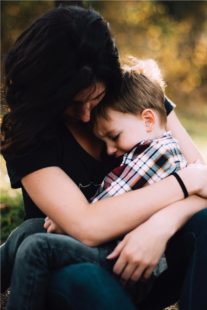Autism: Diagnosis and Treatment
Christian Counselor Spokane
Dr. Robert Melillo, Creator and cofounder of Brain balance centers and author of Disconnected Kids in 2012 reports Autism was first identified in 1943 by Leo Kanner, MD, a psychiatrist at John Hopkins University after he encountered a five-year-old boy whom he described as being “withdrawn and living within himself.” The word autism has only been in use since 1987.
 Though Asperger’s is no longer listed in DSM-V, according to the centers for disease Control and Prevention Autism is a real threat. CDC calls autism a public health crisis and estimates that 1 out of every 88 children and one out of every 54 boys in the United States fits the diagnosis criteria for autism. In 2011 the statistic elevated to 1 in 38 children.
Though Asperger’s is no longer listed in DSM-V, according to the centers for disease Control and Prevention Autism is a real threat. CDC calls autism a public health crisis and estimates that 1 out of every 88 children and one out of every 54 boys in the United States fits the diagnosis criteria for autism. In 2011 the statistic elevated to 1 in 38 children.
More recent research statistics indicate that the prevalence is probably even higher. And goes on to say that autism was reported a rare disorder just a generation ago. it is estimated that 60-65 percent of children in Spokane’s foster care system have a diagnosis of autism. (Childrens Home Society and the Isaac Foundation, 2017)
Reaching an Autism Diagnosis
Autism disorder is sometimes misdiagnosed as ADHD, according to Enrico Gnaulati, Ph.D. in his book Back to Normal. ADHD symptoms include overlooking or missing details; often has difficulty staying on task; is unable to follow through on instructions; has difficulty organizing tasks and activities; often avoids, dislikes, or is reluctant to engage in tasks that require sustained mental effort; often loses things necessary to complete a task; is easily distracted; and is often forgetful in daily activities.
Autism is neurological. As a parent, it would be very confusing for me to understand what autism looks like. In Karen Siff Exkorn’s book, The Autism Source Book Everything You Need to Know About Diagnosis, Treatment, Coping, and Healing, she breaks it down to a simpler explanation which includes but doesn’t look alike in all children: impairment in social interaction; impairments in communication; restrictive, repetitive, and stereotyped patterns of behavior, interests, and activities; and again, not all children display the same symptoms.
Asperger’s was not included in the DSM-5. In Karen Siff Exkorn’s book, she notes that Asperger’s was named after Han’s Asperger who was a physician in the 1940s that studied a group of children similar to the group the Leo Kanner diagnosed as Autistic. Asperger’s was considered a high functioning autism disorder due to the child having average to above average intelligence and average to advanced language skills.
 It was also found that these children in Han’s Asperger’s study developed communication skills within the average range for the first few years of life with these children being very intelligent. However, “quirky” behaviors, awkward motor skills, repetitive behaviors, or difficulty relating to others was identified by parents. It was noted that Asperger’s wasn’t diagnosed until school age and was more common in boys than girls.
It was also found that these children in Han’s Asperger’s study developed communication skills within the average range for the first few years of life with these children being very intelligent. However, “quirky” behaviors, awkward motor skills, repetitive behaviors, or difficulty relating to others was identified by parents. It was noted that Asperger’s wasn’t diagnosed until school age and was more common in boys than girls.
Temple Grandin, Ph.D. and Debra Moore, Ph.D. collaborated in writing the book The Loving Push in 2015 which includes the following short excerpt: “Anxiety and depression commonly co-exist with autism due to sensory overwhelm.” Anxiety can be very debilitating and can co-inside with depression.
It is very important to address and treat possible anxiety and depression. Temple Grandin, Ph.D., and Debra Moore Ph.D. also mentioned; “when anxiety and depression are present autism symptoms worsen.” Bullying is a popular topic these days. Children with autism are not exempt from bullying which leads to feelings of anxiety and depression like any other child and adolescent.
Treatment for Autism
Grandin and Moore mention that gambling addictions can occur, which can also cause huge additional problems. Gaming provides a lot of sensory impute that those with autism are drawn to. Learning to be mindful of triggers (which is a common treatment option for any addiction) and learning to be mindful of emotional responses that occur during gaming can be helpful when the urge to participate in gaming arises.
Cognitive Behavioral Therapy can be a treatment option and is noted by Temple Grandin, Ph.D. and Debra Moore Ph.D. in their book: the Loving Push written in 2015 as being the most effective in the treatment of autism because Cognitive Behavioral Therapy is utilized to identify thoughts, feelings, and behaviors that cause anxiety and distress. Those with autism can learn how to be able to dispute and “stop” negative thoughts.
Relaxations skills are another important learning tool to calm stress and anxiety. Breathing techniques prompts focusing on your breathing and thus taking your mind off of negative thoughts and worries. A young man diagnosed with autism shared with me that handling a rubric cube grounds him. A lot of kids and adults who have been diagnosed with autism have service dogs or pets that provide comfort and socialization.
Service animals and pets love unconditionally. Riding horses benefits many people with disabilities particularly autism. The constant movement of horses seems to require the riders to constantly have to adjust their balance. Riders as young as age three, are accompanied by a leader who helps to guide the horse. This appears to improve the riders focus, core strength, balance and communication skills.
They can also provide relaxation and distract from symptoms of worry anxiety, stress, and depression. Have you ever met a services animal, a cute cuddly puppy, or kitten that didn’t bring you joy? Medications and cognitive behavioral therapy have proven to be successful when utilized together.
Parental Coping
As a therapist in treating Autism I see and hear parent’s frustration, sadness, heart break, depression, fear, isolation, and feeling like this is all their fault. Karen Siff Exhorn cautions parents to not get caught up in what caused your child’s illness (it’s not your fault) and at the same time says it is natural to feel guilt. She advises that you focus instead on getting your child treatment.
 Karen notes a parent saying; “Like Alice in Wonderland, I was sliding down the rabbit hole. I lost sight of everything around me. I put my work on hold, stopped talking to my friends, and pretty much shut myself away in our house.” It feels like your whole life needs to be completely devoted to your child. You feel like no one understands. Therefore, you become exhausted, you feel your alone in all of this because you isolate.
Karen notes a parent saying; “Like Alice in Wonderland, I was sliding down the rabbit hole. I lost sight of everything around me. I put my work on hold, stopped talking to my friends, and pretty much shut myself away in our house.” It feels like your whole life needs to be completely devoted to your child. You feel like no one understands. Therefore, you become exhausted, you feel your alone in all of this because you isolate.
The lady who felt like she was sliding down the rabbit hole said she had a really good therapist who helped her realize she needed a friend. Parents deal with autism differently. While a mother may place all of her energy caring for the child the father may put his whole existence in to work or vice versa.
When parents are supported through support groups and the community they find they can come together and work together in providing the best care for the family as a whole. And when you come together as a community you can gain education, information, and support from one another. You will also as a community come to terms with Autism and issues related to the diagnoses.
Other Support
Support groups for those diagnosed with autism and for parents whose children have been diagnosed with autism may be available in your area to provide socialization, education, and support in managing symptoms. According to Exkorn, April is Autism Month. The Great Wolf Lodge, during the month of April, collaborating with Autism Speaks, put on a drive to raise at least $70,000 for World Autism Month.
Autism speaks focuses everyday on promoting for people with autism across the spectrum and throughout the life span and increasing understanding and acceptance of people with autism and their families. Autismspeaks.org
Autism Speaks is an autism advocacy organization in the United States that sponsors research and conducts awareness and out reach activities aimed at families, governments, and the public. Autism Speaks was founded in February of 2005 by Bob Wright and Suzanne Wright. Autism Speaks Headquarters is located in New York City. Autism Speaks mission is to enhance lives today and in accelerating a spectrum of solutions for tomorrow.
Community Support in Spokane
Community Support Northwest Autism Center Parent to Parent the Arc of Spokane. 320 E second Avenue, Spokane, Washington 99201. Contact: Helen Block who provides emotional support and community resources information to families that have children with special needs. Parent to Parent The Arc of Spokane also provides monthly support group meetings and sibling workshops. WWW.nwautism.org/?p=943
 ASW Spokane Chapter-Autism Society of Washington promotes lifelong community access for persons within the autism spectrum through family support, public awareness, advocacy, and collaboration with community partners. Family support meetings are offered throughout the year on the 3rd Wedsnday of the month.
ASW Spokane Chapter-Autism Society of Washington promotes lifelong community access for persons within the autism spectrum through family support, public awareness, advocacy, and collaboration with community partners. Family support meetings are offered throughout the year on the 3rd Wedsnday of the month.
Free movie tickets are provided for sensory friendly movies. A free holiday reception following the December sensory friendly movie. A picnic in August for adults. Hosted Pizza Party/support meeting in October for adults. Monthly hosted Game Day support group for teens and young adults. Family activity event for kids on the spectrum ages 7-12. www.autismsocietyofwa.org/asw-spokane/about-us
The Autism Society began the Safe and Sound initiative in 2005 to provide much needed resources to the Autism community on topics such as general safety, emergency preparedness and prevention, and risk management. Safe and Sound presents information and strategies that are beneficial to those diagnosed with Autism, their families, and the professionals that work with those diagnosed with autism. They also provide training to first responders-those who are first on the scene in an emergency situation. www.autismsocietyofwa.org/asw-spokane/about-us
On A Positive Note
There is a stronger scientific understanding of autism today, which promotes better treatment and more effective treatment options of autism. It is vitally important that parents carefully evaluate treatment options that are scientifically proven effective and safe.
Several doctors and researchers are in agreement that children should be diagnosed as early in age as possible meaning beginning as early as 12-18 months of age. If you suspect your child may be showing symptoms of Autism, Exkorn suggests that you take your child to a Developmental Pediatrician that may be recommended by your child’s pediatrician.
In Closing
I’m grateful and thankful for the opportunity I have had in being chosen to provide therapy and treatment for those who have been diagnosed with Autism. Those diagnosed with autism are amazingly wonderful people. They have potential that is unimagined. I’ve learned from clients their great resilience’s, patience, and willingness to learn ways to cope with autism, learning new ways to communicate and socialize with others.
I’ve seen through clients amazing humor and intelligence. Someone who can put a puzzle together in mere minutes. Someone who can learn to communicate through pictures. Someone how can navigate through a cell phone or iPad in a matter of seconds. I’m grateful for the family members who show great strength, their time, and their caring hearts in supporting their loved ones who struggle with the symptoms of autism, and family members who have chosen me and trusted me in helping their loved ones.
I am grateful and thankful for the person who has come in to my life and who dedicated her life to treating autism and has led me through the process of treating autism. I’m grateful and thankful to God for guiding me through this calling.
References
Childrens Home Society and the Isaac Foundation, 2007
Autism Speaks https://en.wikipedia.org/wiki/
Diagnostic and Statistical Manual of Mental Disorders (DSM-5) 5thed. (Washington, DC London England: American Psychiatric Publishing, APA, 2013), page 50-51
Enrico Gnaulati, Ph.D. Back to Normal. Published in 2013
Temple Grandin, Ph.D. and Debra Moore, Ph.D., Loving Push. Published in 2015
Christopher Jardine Great wolf Lodge Article April 17, 2019, cjardinewiscnews.com
Karen Siff Exkorn. The Autism SorceBook. Everything You Need to Know about Diagnosis, Treatment, Coping, and Healing. Copyright 2005. Harper Collins Publishers. Published in 2006.
Dr. Robert Melillo. Disconnected Kids. Published in 2012.
www.nwautism.org/?p=943
www.autismsocietyif wa.org/asw-spokane/about_us
www.spokanecares.org/autism-spokane.php.
Photos:
“Absorbed”, Courtesy of Hal Gatewood, Unsplash.com, CC0 License; “A Cuddle from Mom”, Courtesy of Jordan Whitt, Unsplash.com, CC0 License; “Heartfelt”, Courtesy of Anna Kolosyuk, Unsplash.com, CC0 License; “Little Legs Need Rest”, Courtesy of Michal Parzuchowski, Unsplash.com, CC0 License





